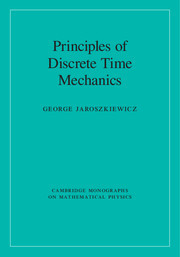Description
Principles of Discrete Time Mechanics
Cambridge Monographs on Mathematical Physics Series
Author: Jaroszkiewicz George
A unique introduction to the chronon hypothesis, systematically building the theory up from scratch.
Language: English
Subject for Principles of Discrete Time Mechanics:
Approximative price 128.66 €
In Print (Delivery period: 14 days).
Add to cart
Publication date: 04-2014
360 p. · 18x25.4 cm · Hardback
360 p. · 18x25.4 cm · Hardback
Description
/li>Contents
/li>Biography
/li>
Could time be discrete on some unimaginably small scale? Exploring the idea in depth, this unique introduction to discrete time mechanics systematically builds the theory up from scratch, beginning with the historical, physical and mathematical background to the chronon hypothesis. Covering classical and quantum discrete time mechanics, this book presents all the tools needed to formulate and develop applications of discrete time mechanics in a number of areas, including spreadsheet mechanics, classical and quantum register mechanics, and classical and quantum mechanics and field theories. A consistent emphasis on contextuality and the observer-system relationship is maintained throughout.
1. Introduction; 2. The physics of discreteness; 3. The road to calculus; 4. Temporal discretization; 5. Discrete time dynamics architecture; 6. Some models; 7. Classical cellular automata; 8. The action sum; 9. Worked examples; 10. Lee's approach to discrete time mechanics; 11. Elliptic billiards; 12. The construction of system functions; 13. The classical discrete time oscillator; 14. Type 2 temporal discretization; 15. Intermission; 16. Discrete time quantum mechanics; 17. The quantized discrete time oscillator; 18. Path integrals; 19. Quantum encoding; 20. Discrete time classical field equations; 21. The discrete time Schrodinger equation; 22. The discrete time Klein–Gordon equation; 23. The discrete time Dirac equation; 24. Discrete time Maxwell's equations; 25. The discrete time Skyrme model; 26. Discrete time quantum field theory; 27. Interacting discrete time scalar fields; 28. Space, time and gravitation; 29. Causality and observation; 30. Concluding remarks; Appendix A. Coherent states; Appendix B. The time-dependent oscillator; Appendix C. Quaternions; Appendix D. Quantum registers; References; Index.
George Jaroszkiewicz is an Associate Professor at the School of Mathematical Sciences, University of Nottingham, having formerly held positions at the University of Oxford and the University of Kent.
© 2024 LAVOISIER S.A.S.

